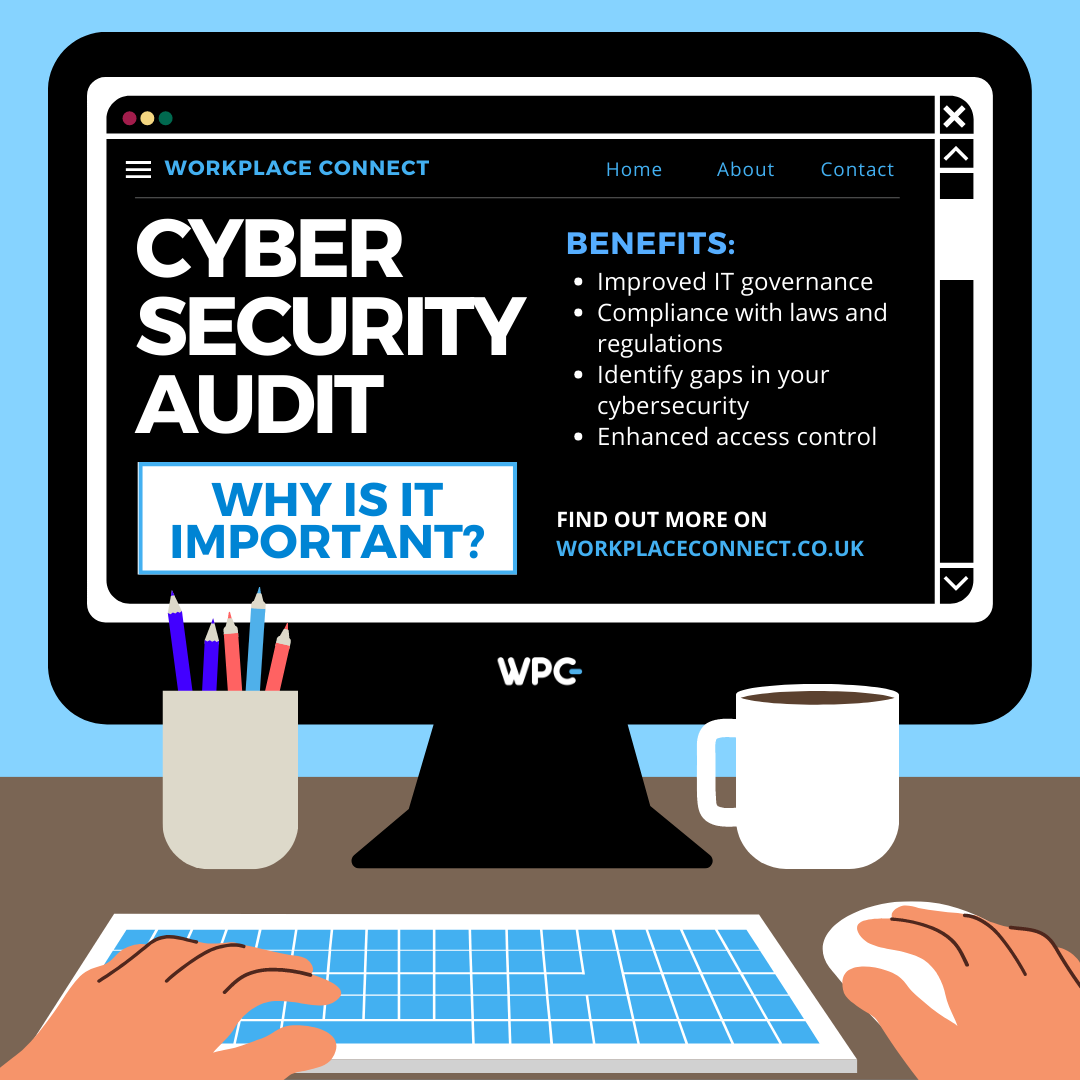One of the major mistakes companies make is expecting that routine risk assessments maintain and manage their cybersecurity solutions.
Because of how quickly technology is developing and how it is being used in business, this assumption may have serious organizational repercussions.
All around the UK, IT professionals are always preparing for system security breaches. Businesses need to be proactive and have a strong cybersecurity policy in place to stop these potential risks from turning into attacks. An IT security audit may be useful in this situation. Standard network security audits and a strong cybercrime defense system can help to lower risks, reinforce security controls, and improve all aspects of your business operations.
In this article, we’re going to cover the “What? How? Why?” questions you may have on Cybersecurity Audits.
Cybersecurity Audit: What is it?
An exhaustive investigation and review of all cybersecurity-related elements of your company’s IT infrastructure, from policies and processes to security measures and action plans, constitutes a cybersecurity audit. These evaluations are made to find every single weakness that could endanger your company.
Inadequate areas are brought to light through audits, such as backdoors utilized by cybercriminals in popular forms of fraud. Cybersecurity auditing has two main objectives:
- to fulfill regulatory requirements and verify industry-wide certifiable standards
- to give your management team, clients, and suppliers a thorough evaluation of your company’s security stance
Furthermore, a network security audit is also excellent for identifying potential improvements to your security procedures, controls, and risk management. In other words, having a second pair of eyes could be the distinction between being safe and becoming the next target of a cyberattack.
Cybersecurity Audit Benefits
Passing a compliance test is only one aspect of doing a cybersecurity audit. When evaluating if it’s time for an audit, most people tend to overlook some advantages to your company. Here are some more advantages you can enjoy in addition to decreasing downtime and preventing financial loss as a result of a cyberattack.
1.) Ensure Data Protection
Many businesses make the error of believing their confidential information is secure. The effectiveness of the methods employed to compromise these systems is ensured by having a routine for auditing things like control of network access, encryption used, transmissions, and other extremely sensitive activities. Regular audits serve as the sole method to make sure a cybersecurity assault won’t happen to you despite the fact that you haven’t yet experienced one.
2.) Consider Operations From a Different Perspective
You’re revealing your digital security while also receiving a rare look at how your company’s operations are performing. You may optimize not just your cybersecurity but also the rest of your operations with the help of a thorough analysis of your infrastructure. You have the chance to be even more open about what may be changed when you have an audit performed by a third party.
3.) Find Security Breach Points
It’s crucial to be aware of your unique problems while choosing the cybersecurity solution that will work best for you. A customized strategy that best meets your objectives can be created by exposing those coverage gaps and providing you with the unique information you need.
4.) Keep Up With Regulations
Regulations are here to stay. Our industries will continue to be driven by data, thus securing that data will be crucial moving ahead. You are lagging behind on the rules that safeguard your company—and not only from security threats—the longer you put off taking a close look at your security systems. Financial damage might be done to your business as a result of compliance violations.
5.) Apply Suggestions to Make Improvements
You can receive objective, new eyes on the overall operation of your firm through an external audit. This unbiased evaluation relieves the strain of comprehending the specifics of your security requirements, especially when combined with your readiness to accept the objective analysis. This research is done for you by a professional, who then suggests legal remedies to safeguard you against hazards unique to your industry.
If 5 reasons still aren’t enough to convince you of its importance, here are 5 more:
- Evaluate your weaknesses and how to strengthen them.
- Improve reputation
- Test your system’s built-in controls
- Increase employee awareness of cybersecurity
- Assure customers, suppliers, and business partners that their data is secure.
Does your Company Really Need a Cybersecurity Audit?
Your organization needs a cyber security audit if it wants to prevent a data leak. These audits assist your company in meeting contractual, statutory, and legal obligations related to cyber safety.
You will have a better understanding of your risk management capabilities after the cybersecurity practices of your company have been reviewed. Cybersecurity audits also improve your status as a data holder.
You gain knowledge about risk governance and the significance of staff training. When maximizing the most effective crisis management procedures for your firm, you also ensure ongoing operations.
Remember that hackers attack cybersecurity protocols, procedures, and employees in addition to system weaknesses. An overview of your company’s cybersecurity vulnerabilities, threats, and hazards, as well as their effects, is provided through a cybersecurity audit.
What Is Covered by a Cybersecurity Audit?
It’s best to comprehend what a cyber security audit includes in order to maintain your data secure. This assessment allows IT specialists to find hazards and vulnerabilities across your whole system. The following are typically covered by auditors:
Data Security
The first step in a data security audit is a thorough examination of your network’s access control. Auditors also take note of your use of encryption, the security of your data while it is in transit and the protection of your data at rest.
Operational Security
An extensive examination of all the security measures you have in place is done during a cyber security audit. Additionally, it evaluates each step, process, and regulation in your data loss prevention plan.
Network Security
All network security methods and controls are examined by auditors. They inform you of the effectiveness of your security operation center. Also, they examine whether your antivirus is set up correctly and whether any other security monitoring tools are functioning as intended.
System Security
Auditors check that the hardening procedure for your data is functioning properly at this point. Additionally, they make sure that privileged access is properly controlled and that security patches are up to date.
Physical Security
The condition of all gadgets used to connect to your network is examined by auditors as the final step in a cyber security audit. They look at disk encryption, and various kinds of role-based security measures, including the application of MFA or biometric information.
Internal vs. External Cybersecurity Audits: What’s the difference?
Your IT department can usually do a cyber security audit for you. But there’s a danger that they won’t have all the equipment necessary to do the task successfully.
The best way to take a close look at the internal workings of your systems and networks is to collaborate with a third party. Internal audit and cyber security are only ever mentioned together in the context of cost-cutting. Time is a big aspect as well because internal audits are frequently completed more quickly.
If you manage a small business without an IT department, outsourcing might be rather pricey. But, you can still study how to audit your network’s cyber security. That being stated, external auditors provide an unbiased and objective view of your systems while expertly spotting flaws and problems.
Since their unbiased assessment can identify every cybersecurity weakness, they are also the sharpest critics. Final reports with thorough solutions to each issue they uncover will be provided.
The decision between internal and external audits ultimately comes down to budget, even if it’s not the best metric. An IT team-familiar system is examined and fixed as part of the internal audit function in cybersecurity.
Unfortunately, this can result in prejudice or even overlooking cybersecurity issues that could harm the business. Yet, external auditors won’t hesitate to point out the particular areas of your system’s vulnerability. Depending on your company’s demands, you have the freedom to choose.
Cybersecurity Audit Checklist
The fundamental standards that must be evaluated by the auditors are listed on a cyber security audit checklist. Depending on the field and size of the organization, the majority of checklist items are customized for each one.
Nonetheless, every audit includes a fundamental set of categories. Regardless of your niche, you should always ask for these things:
- A list of all hardware resources
- A list of every piece of software your business uses
- Continual vulnerability management tools
- Procedures for granting administrative rights
- Security setup for both software and hardware in all devices, including computers, terminals, servers, and cellphones
- Audit records, maintenance and monitoring schedules, and more
- Browser and email protection
- Malware protection
- Controlled access to all protocol and server data, as well as network ports
How Often Should You Perform a Cybersecurity Audit?
After you understand how to conduct a cyber security audit, you must respond to the following query: How frequently should you do these audits on your systems? The solution is difficult. It varies depending on the size of your business and budget.
Big corporations conduct recurring cyber security audits because they manage significant data hubs. Depending on the extent of its operations, a middle-sized corporation has to conduct these audits twice a year. A yearly audit is sufficient for small enterprises.
You Need It Audited
As technology advances, so does the dangers it brings. When it comes time for a cybersecurity audit, the more automated your access control systems are, the less pressure you’ll feel. Workplace Connect can offer cybersecurity tools to help you stay current with the constantly shifting regulatory landscape while also protecting your personal data.
Contact us today to know how we can assist you in adhering to your company’s needs!







